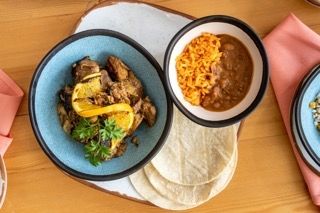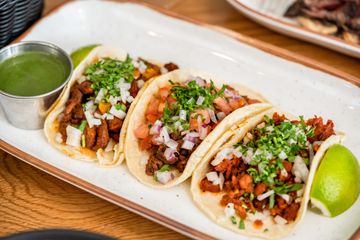Is Mexican Food Healthy And Balanced? Unpacking the Nutritional Conveniences of Standard Components
The concern of whether Mexican food is healthy welcomes an expedition of its typical active ingredients. Beans and corn function as foundational staples, abundant in healthy protein and fiber. Avocados supply helpful fats, while different natural herbs and spices include flavor and health advantages - New York Times rated. Together, these parts develop a tapestry of nutrition. The healthiness of Mexican food typically depends on preparation approaches and part dimensions. What function do these aspects play in establishing its overall nutritional value?
The Power of Beans: Healthy Protein and Fiber-Rich Staples
Although usually overlooked, beans function as a keystone of Mexican food, supplying a riches of dietary advantages. Rich in protein, they are an excellent plant-based option for those looking for to meet their nutritional healthy protein requires. This high protein content supports muscular tissue repair and growth, making beans vital for both meat-eaters and vegetarians alike. In addition, beans are a remarkable source of nutritional fiber, which assists in food digestion and promotes a sensation of fullness, possibly assisting with weight monitoring.
The selection of beans utilized in Mexican recipes, such as black beans, pinto beans, and kidney beans, adds to a diverse flavor account and can improve meals nutritionally. Beans are low in fat and contain essential vitamins and minerals, consisting of folate, iron, and magnesium. With each other, these characteristics make beans an essential ingredient, delivering both nourishment and nourishment in standard Mexican fare.
Corn: a Versatile Grain With Nutritional Perks
Corn stands out as a flexible grain essential to Mexican food, celebrated not only for its cooking applications but also for its remarkable dietary account. As a key ingredient in recipes like tortillas, tamales, and pozole, corn gives crucial nutrients that add to a balanced diet regimen. Rich in carbohydrates, it offers as a considerable energy resource, while additionally being low in fat, making it a favorable option for numerous dietary needs.
In addition, corn is a good resource of nutritional fiber, which assists in food digestion and advertises satiation. It has significant quantities of vitamins such as B-complex vitamins, which are essential for energy metabolic rate. The visibility of antioxidants, particularly carotenoids, contributes to overall health and wellness by decreasing oxidative stress. Additionally, corn is gluten-free, providing to those with gluten level of sensitivities. Overall, the nutritional advantages of corn emphasize its relevance in conventional Mexican food and its function in a healthy diet.
Avocados: Healthy And Balanced Fats and Nutrients in Every Bite
Avocados play a significant function in Mexican cuisine, matching meals with their luscious structure and rich taste. Beyond their culinary appeal, avocados are celebrated for their impressive dietary profile. They are a rich resource of healthy and balanced monounsaturated fats, which can aid reduced negative cholesterol degrees and support heart wellness. In addition, avocados are packed with essential minerals and vitamins, including potassium, vitamin E, and B vitamins, adding to overall wellness.
The high fiber web content in avocados help food digestion and promotes satiation, making them a beneficial addition to any kind of meal. Their special nutrient structure can likewise sustain skin health and provide anti-inflammatory advantages. Including avocados right into traditional Mexican dishes or appreciating them as a standalone snack can boost both taste and nutrition, showing why they are a cherished staple in Mexican food. In general, avocados offer a tasty way to take pleasure in healthy and balanced fats and important nutrients in every bite.

Herbs and flavors: Flavorful Wellness Boosters
While enjoying the abundant tastes of Mexican cuisine, one can not ignore the crucial function that spices and herbs play in enhancing both taste and health. Ingredients such as chili, cilantro, and oregano peppers not just add to the vivid taste account but also give substantial health and wellness benefits. Cilantro is understood for its detoxifying residential properties, assisting to get rid of hefty steels from the body, while oregano is loaded with antioxidants and possesses anti-inflammatory effects.
Chili peppers, a staple in many Mexican meals, have capsaicin, which has been linked to enhanced metabolic process and pain relief. Additionally, seasonings like cumin and coriander support digestion and may assist in blood sugar level policy. Integrating these savory health boosters right into dishes not only boosts the culinary experience yet additionally promotes general well-being, making Mexican food not simply delicious, yet also nutritionally useful.
Traditional Cooking Approaches: Enhancing Nourishment and Taste
Standard food preparation approaches in Mexican food play an essential role in enhancing both nutrition and taste, as they often focus on fresh active ingredients and classic strategies. Methods such as nixtamalization, where corn is saturated and cooked in an alkaline service, not only boost the nutrient profile of tortillas but likewise boost their digestibility - take out and delivery. Additionally, the use of slow food preparation methods, like stewing or braising, allows flavors to blend wonderfully while retaining the stability of the components

Frequently Asked Concerns
Are Mexican Food Portions Usually Larger Than Other Cuisines?
Mexican food parts are typically larger than those of numerous various other foods. This characteristic mirrors traditional eating techniques, highlighting public sharing and hearty meals, which can cause a more considerable serving size on the whole.
Exactly how Does the Prep Work Method Affect Healthfulness of Mexican Food?
Prep work approaches greatly influence the healthiness of Mexican food. Techniques such as barbecuing or steaming maintain nutrients, while frying can raise harmful fat material. Selections of ingredients and cooking styles ultimately identify total nutritional value.
Can Mexican Food Be Customized for Specific Nutritional Limitations?
Mexican food can undoubtedly be customized for particular nutritional constraints. Replacements, such as making use of corn tortillas for gluten-free diet regimens or including more vegetables, make it possible for individuals to delight in conventional tastes while suiting numerous dietary demands.
What Prevail Misconceptions Concerning Mexican Food and Wellness?
Usual false impressions about Mexican food include the idea that it is naturally undesirable, excessively spicy, and entirely focused on fats. Actually, conventional meals typically include nutritious active ingredients and can be customized to different dietary needs.
Exist Healthier Alternatives at Mexican Dining Establishments?
Healthier options at Mexican restaurants usually include grilled meats, beans, and fresh veggies. Picking meals that emphasize entire active ingredients and avoiding hefty sauces can lead to an extra nourishing eating experience, advertising total wellness.
The range of beans utilized in Mexican dishes, such as black beans, pinto beans, and kidney beans, contributes to a diverse flavor profile and can improve meals nutritionally. Avocados play a significant function in Mexican food, complementing recipes with their churros luscious texture and rich taste. Including avocados into traditional Mexican dishes or enjoying them as a standalone treat can enhance both flavor and nourishment, demonstrating why they are a beloved staple in Mexican food. While taking pleasure in the abundant flavors of Mexican food, one can not forget the necessary function that spices and herbs play in boosting both taste and health and wellness. Typical cooking approaches in Mexican cuisine play an important role in boosting both nutrition and taste, as they commonly focus on fresh ingredients and time-honored strategies.